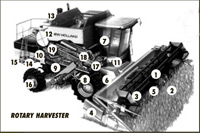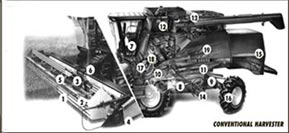
Parthenium - our greatest threat
Operators of grain harvesting machinery: Keep NSW parthenium weed-free
Grain harvesting machinery, vehicles and equipment that have been used in Queensland are prohibited from entering NSW from Queensland under the NSW Biosecurity Act 2015, unless the operator has:
- cleaned the machinery/equipment in a manner that is consistent with Schedule 1 of the Biosecurity Order (Permitted Activities) 2019 (BOPA), AND
- presented the machinery/equipment for inspection at an approved facility, AND
- submitted a Record of Movement (PDF, 488.02 KB) to the NSW Department of Primary Industries.
Operators that meet these requirements are issued with a Carrier Biosecurity Certificate that certifies the requirements of the BOPA have been met. The penalty for importing parthenium weed carriers into NSW from QLD without meeting with requirements of the BOPA starts at $1,000 and can reach $2.2million if court proceedings ensue.
Approved inspection facilities are located at:
| Town | Phone number |
|---|---|
| Goondiwindi, Qld – Kildonan Road | (07) 4671 1227 |
| Hebel, Qld – Margaret Street | (07) 4625 0916 |
| Mungindi, Qld – Carnarvon Hwy | (02) 6753 2323 |
All offices require 24 hours’ notice of your intention to present machinery for inspection. To notify offices, ring and leave a message on the answering service. Machinery can only be inspected during daylight hours.
Cleaning procedures for importation of grain harvester or comb trailer from Queensland
Operators of grain harvesting machinery must remove all soil and plant material from the following areas of grain harvesters:
| Rotary harvester: | Conventional harvester: |
|---|---|
 |  |
Numbers that appear in the diagram are described in the list below. At the border, you will be required to sign a declaration that each of the areas listed have been cleaned. You should also clean any other areas of a machine or vehicle that are capable of carrying plant material.
All harvesters
- The area under the skid plate. (At the border, access to this area must be provided, preferably by removal of the skid plates)
- Each header knife and finger
- The auger located horizontally across the header
- The area behind any cover on the header
- The area within any belts on any draper front (if fitted)
- The feeder house
- The driver's cab compartment floor area
- The cleaning fan and the area between the bottom of the fan housing and any shield under the fan housing
- The chassis, including the inside of any chassis rail ledges, back axle-beam and undercarriage areas
- Any tailing auger
- Any sieve area, including the full length and width of the grain pan
- Any grain bin area, including any auger
- The engine compartment, including the radiator core
- Any grain or 'repeat' elevator including any cups and rubber flights
- Any straw spreader or chopper
- Any tyres and rims
Conventional harvester
- The threshing or separating area, including the drum and concaves behind the rasp bars and lead-in plates and around concave wires
- The beater drum, including the area between the drum and walkers
- The straw walkers, including the beater and the chaff pan, underneath any straw walker and any concealed areas under rubber air flaps
Rotary harvester
- The external top and side of the conical section of the rotor cage
- The areas inside the top of the conical section
- The threshing or separating area, including along the rotor cage
THE FOLLOWING EQUIPMENT AND VEHICLES MUST ALSO BE CLEANED TO REMOVE SOIL AND PLANT MATERIAL.
Bins and augers
- Must be empty and clean
Escort and transport vehicles
- Must be cleaned externally
- Cabin, tray and any storage boxes must be clean
- Radiator must be clean
Parthenium weed is a prohibited plant in NSW under the NSW Biosecurity Act 2015. It's a major threat to the agricultural industry and the community because it:
- causes respiratory problems and causes severe dermatitis
- contaminates grain
- is unpalatable and toxic to livestock
- reduces crop yields
- can taint meat or milk
- outcompetes pastures
- is a host plant for crop viruses.
All vehicle and machinery operators should clean their machines and vehicles before they leave a farm or mine and before approaching the NSW/QLD border. Parthenium seed is very small, so machines and vehicles should be cleaned with a high-volume air compressor. Water jets should be used only for mud and other contaminants that will not yield to air treatment.
Parthenium weed seed is small and can remain trapped in inaccessible parts of harvesters and other farm and mineral exploration machinery and vehicles. Any maintenance or repairs that require the loosening of mechanical or structural components can dislodge parthenium weed seed. For any repairs then, the harvester should be removed from the crop and taken to an area that does not favour seedling establishment and that can be frequently inspected by the property owner. A gravelled area is ideal. Property owners should be informed about this location and advised to inspect the area regularly.
Property owners and occupiers: Keep NSW parthenium-free
Any person living in NSW that introduces the following vehicles and equipment onto the land they manage should check whether they are clean and free of mud, hay and grain before allowing them onto their property:
- grain harvesters (including the comb or front)
- comb trailers (including the comb or front)
- bins used for holding grain during harvest operations
- augers or similar equipment used for moving grain
- vehicles used for transporting grain harvesters
- vehicles used as support vehicles with grain harvesters and that have been driven in paddocks during harvest operations
- mineral exploration drilling rigs and vehicles used for transporting those rigs.
Ask the operator whether the machinery and equipment has been used in Queensland, and if it has, ask to see a copy of the Biosecurity Certificate issued by DPI at the NSW/QLD border.
Check your property regularly for parthenium weed seedlings and if you think you have found parthenium weed, call 1800 680 244 or your local council weeds biosecurity officer.
Parthenium weed areas in Queensland
Approximately 60 million hectares of Queensland are affected by parthenium weed.
Parthenium weed infestations in Queensland are most likely to occur in the shires of Central Highlands, Izaac, Whitsunday, Charters Towers, Rockhampton, Maranoa and North Burnett. Isolated infestations occur in other areas so operators of grain harvesting machinery should inquire locally to avoid harvesting crops that contain parthenium weed.

